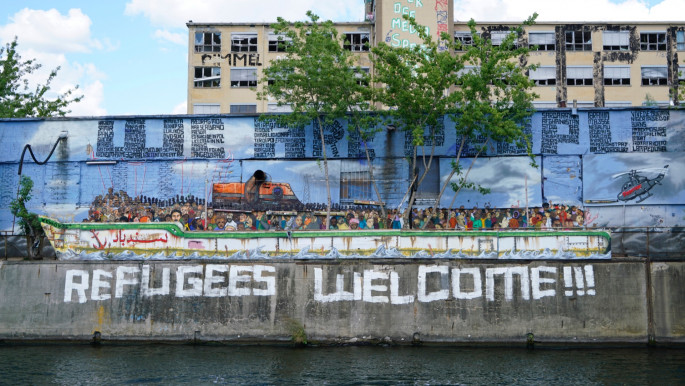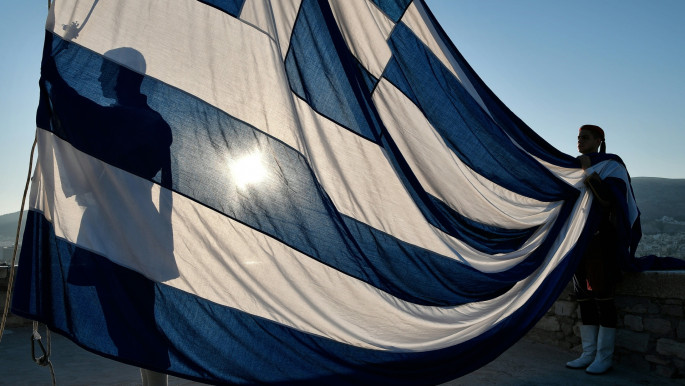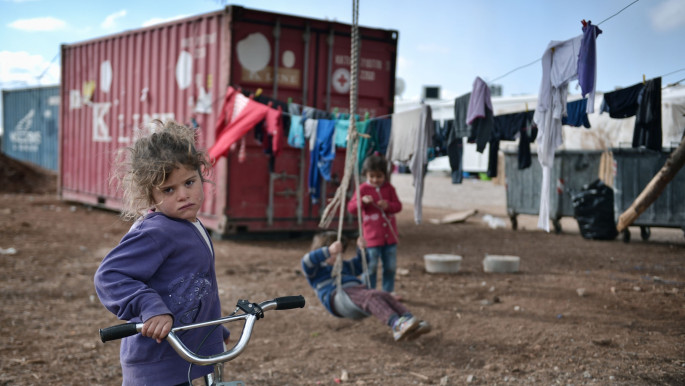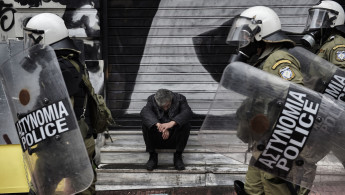Refugee groups fearful as Greek government brings back dictatorship-era anti-protest law
Many academics and civil society actors fear the implications of the proposed law, in a country that regularly sees large demonstrations against police brutality and the mistreatment of migrants and refugees.
The bill gives the police the highest authority on matters of protests. It stipulates that protesters apply to the police for a license to demonstrate. Groups must do so via an assigned organiser who will be financially liable for any damage to property or obstruction of economic life deemed to have been caused by the protest.
The bill
The law would allow the police to restrict public gatherings by force that the police deem necessary. Those who participate in a banned public outdoor gathering could be punished by up to two years imprisonment.
"The aim of the bill is to put an end to the chaos created," government spokesman Stelios Petsas said, according to Reuters. Citing at least 80 rallies in Athens alone in May, the government says the bill aims to balance the right to assembly with the socio-economic needs of the nation.
 |
Greece regularly sees large protests against police brutality and the mistreatment of migrants and refugees |  |
Two exceptions have been outlined in the law; International Workers Day on 1 May and 17 November, the anniversary of a military attack on the student uprising which would lead to the fall of Greece's military dictatorship.
Keerfa (The Movement United Against Racism and the Fascist Threat) organises resistance to racist state and civilian violence, often against migrants and refugees. Petros Konstadinou, the groups' coordinator, argues that the new law places heavy restrictions on groups such as his.
"We are a mass organisation. We mobilise thousands against fascists and Nazis...one person cannot be liable for any damage that may happen during this. It is simply not practical," Konstadinou told The New Arab. "This is, in practice, an act of the government to criminalise protest".
 |
|
| Read more: 'No one should be left to die': Fighting to protect refugees in Europe amid Covid-19 |
Ioanna Manoussaki-Adamopoulou, a PhD candidate at University College London researching refugee rights in Greece, says the bill will "will penalise protesters and minimise spontaneity – as we've seen recently, a lot of protest is spontaneous reactions to events".
Manoussaki-Adamopoulou draws comparisons across Europe and America, where mass protests have occurred in response to the police killing of George Floyd in the US. Such demonstrations were not planned and do not have officially designated organisers.
A solidarity event was held in Athens on 26 June, in which thousands marched under banners such as 'Black Lives Matter: Refugee Lives Matter'. The rally was dispersed using tear gas. "Most of the world is contesting the repressive role of the police right now, yet this bill seeks to move Greece in the opposite direction," Manoussaki-Adamopoulou told The New Arab.
The bill comes shortly after Greece eased out of a lockdown implemented to control the spread of the Covid-19 pandemic, which had seen an increase in police powers. Permission was required to leave home and tear gas was reportedly used to disperse gatherings in densely populated areas, including neighbourhoods with large numbers of migrants and refugees such as Kypseli in Athens.
Escalating police violence
"The precedent was set in the Autumn of last year, when New Democracy (the current ruling party) revoked the previous governments' plans to hire 2,000 more healthcare workers, and instead hired 2,000 more police," Manoussaki-Adamopoulou says.
 |
Most of the world is contesting the repressive role of the police right now, yet this bill seeks to move Greece in the opposite direction |  |
"This was followed by an increase in records of police stripping of citizens during stop and search operations, and worryingly, taking them into spaces without cameras and beating them up. These are all the practices that remind us of non-democratic dictatorial governments. Such practices have reappeared with ferocity, and with a kind of discourse of Junta-like police powers," she added.
Amnesty International says that a "spike was observed in reports of excessive use of force and ill-treatment by police" in late 2019, with concerns that repeated incidents were not isolated and pointed to a "pervasive culture of impunity for such actions."
Many in Greece anticipate an economic downturn comparable to the crash of 2008 that decimated the tourism-reliant economy. Some say that the new protest bill is a sign of the government's policy direction in the months ahead.
 |
|
| Read more: Greek-Italian maritime deal sends clear message to Turkey as Mediterranean tensions rise |
"We are moving in the escalation of the economic crisis," says Konstadinou. "The timing of this bill can be seen as a sign that New Democracy are going to pursue austerity measures for which they will not find a consensus. This will lead them to face an argument on the streets - this bill is perhaps a preparation for this coming fight".
The refugee movement
Konstantinou suggests that police violence against migrants and refugees, especially in a time of economic crisis, is often deliberate. "It's an essential part of their policy, to try to disorientate people as to who is responsible for the crisis. The scapegoat is the migrants and the refugees".
The government has simultaneously pushed through measures that reduce support for refugees. Over 11,000 are set to be evicted from supported housing as their cash support is reduced, with many families forced to sleep rough in parks and squares. Alleged illegal push-backs of refugee boats by the Greek coastguard have also increased, resulting in the death of four people by drowning on 29 June.
 |
Mass mobilisations are one of the main methods of resistance available to the refugee and migrant movement in Greece |  |
Mass mobilisations are one of the main methods of resistance available to the refugee and migrant movement in Greece, with groups like Keerfa adamant that they will not abide by the proposed bill's terms.
"When we are organising the anti-racist demonstration, we will never ask the government how we should behave; not when they are using racism against refugees and migrants on the border," Konstandinou says.
 |
|
| Read more: 'Catastrophe is coming': Disaster looms as coronavirus reaches Greek refugee camps |
The hot summer period is an unusual time for politics in Greece, as many people are absent from work and educational spaces where political organisation is otherwise undertaken. July is therefore a common month for the government to push through unpopular legislation.
"This is when governments tend to pass anti-democratic laws, the summer shrinks the field of debate – both within the parliament and on the street," says Konstadinou. The bill is due for debate on 10 July, but the minister of citizen protection has suggested that the government may proceed even if a positive consensus is not reached in parliament. This would be in contention with the Greek democratic parliamentary system. In the past, similar laws have been revoked after mass protests.
"When the military dictatorship fell in 1974, the first government tried to limit civil liberties – strikes and student demonstrations secured these rights. Attempts since have similarly been prevented through protest," says Konstadinou.
There have already been large demonstrations protesting the bill, with as many as 3,500 supporters of KKE, the Greek community party, gathering outside of parliament on 2 July.
The KKE said in a statement that "the government is deeply mistaken if it thinks that this junta-inspired construction will be implemented successfully". Further demonstrations by a coalition of leftists, anti-racists and the refugee and migrant movement are planned for 11 July.
Keira Dignan is a freelance journalist and librarian based in Athens, Greece
Follow her on Twitter: @refugeelibrary



